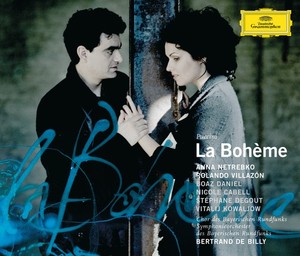“Boheme” times two

Puccini: La Boheme.
Anna Netrebko, Rolando Villazon, Nicole Cabell, Boaz Daniel
Bavarian Radio Symphony Orchestra and Chorus
Bertrand de Billy (Deutsche Grammophon)
Puccini: La Boheme
Norah Amsellem, Marcus Haddock, Georgia Jarman, Fabio Capitanucci
Atlanta Symphony Orchestra and Chorus/Robert Spano
(Telarc)
What crisis in classical recording? When the world’s most popular opera gets two simultaneous new releases to compete with the vast mountain of classic Boheme sets, the record industry can’t be in as bad shape as, say, American newspapers.
Anna Netrebko and Rolando Villazon provide the requisite starpower in Deutsche Grammophon’s new Boheme, conducted with swift momentum and theatrical élan by Bertrand de Billy. Villazon is an ardent, vivid Rodolfo, contributing an impassioned Che gelida manina, some fleeting grit at the top apart. Netrebko provides more mixed rewards. The Russian soprano’s Italian pronunciation takes some getting used, though her velvety mezzo-like tone is undeniably beautiful. The flamboyant Netrebko is not a Mimi by nature, taking a while to grow into the gentle character, yet by the latter acts, the soprano is an affecting heroine with alarmingly congestive coughing, and sensitive vocalism matched by Villazon in the final scene. Nicole Cabell is a spunky if intermittently fluttery Musetta, though she delivers a lovely Quando me’n vo. Boaz Daniel as Marcello leads an exuberant band of supporting bohemians, with high-gloss playing and outstanding choral work by the excellent Bavarian forces.
The new Telarc set is taken from concert performances by Robert Spano and the Atlanta Symphony Orchestra and Chorus taped last September. The cast is solid enough but the performance overall feels restrained and inhibited compared to the bold theatricality of the DG set. Marcus Haddock tends to bluster as Rodolfo, and his attractive tenor turns raw at times, with a not-very-tender Che gelida manina. Like Netrebko, Norah Amsellem as Mimi grows stronger as the performance unfolds and is at her best—as is Haddock– in Acts III and IV. Georgia Jarman is a serviceable Musetta, Fabio Capitanucci a richly Italianate Marcello, and Denis Sedov, a huge-voiced Fafner-like Colline. Spano’s accompaniment is scrupulously prepared and well played by the Atlanta Symphony musicians, with the celebrated ASO chorus predictably brilliant in Act II, and the clear enjoyment of the audience provides some compensating atmosphere for the lack of sizzle on stage.
If you desire a Boheme in 21st-century sound, the DG performance largely provides the goods. I have a guilty fondness for the Herbert von Karajan Decca set, with Pavarotti and Freni in their glorious primes, and the Berlin Philharmonic, no less, as the world’s glossiest pit ensemble. Of more recent vintage, the underrated EMI Boheme with Roberto Alagna and Valentina Vaduva is the most impassioned and theatrical of all, with Antonio Pappano conducting magnificently, and a Café Momus climax that will lift you out of your chair.
Posted in CD/DVD
Leave a Comment
Sat Jul 26, 2008
at 6:35 pm
No Comments






